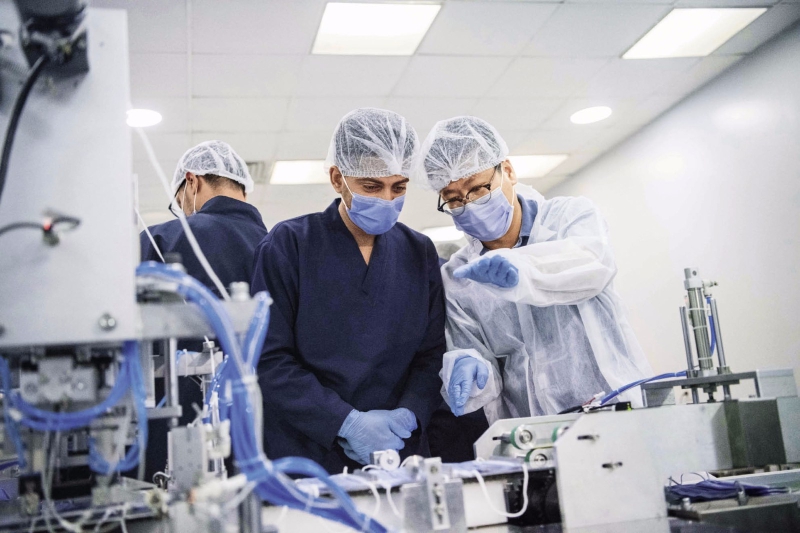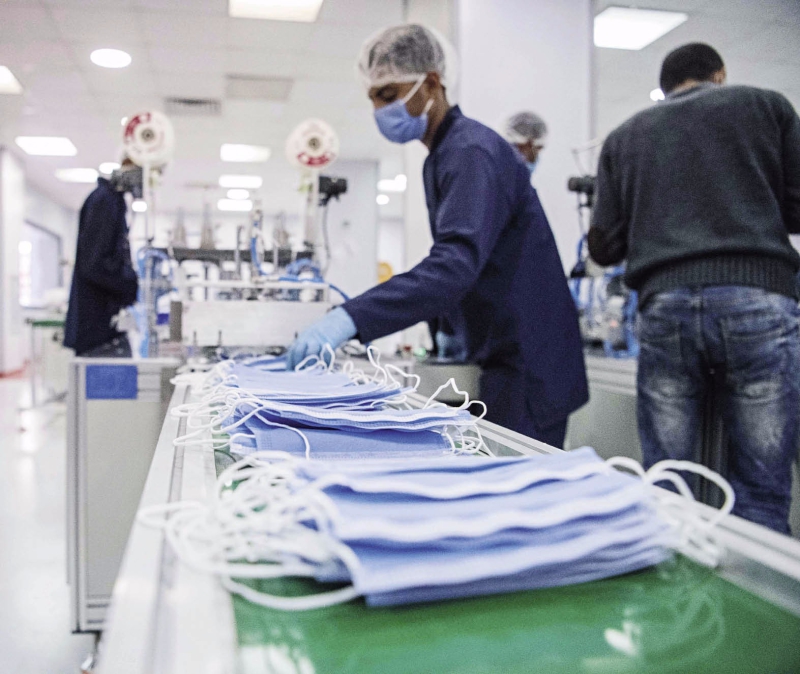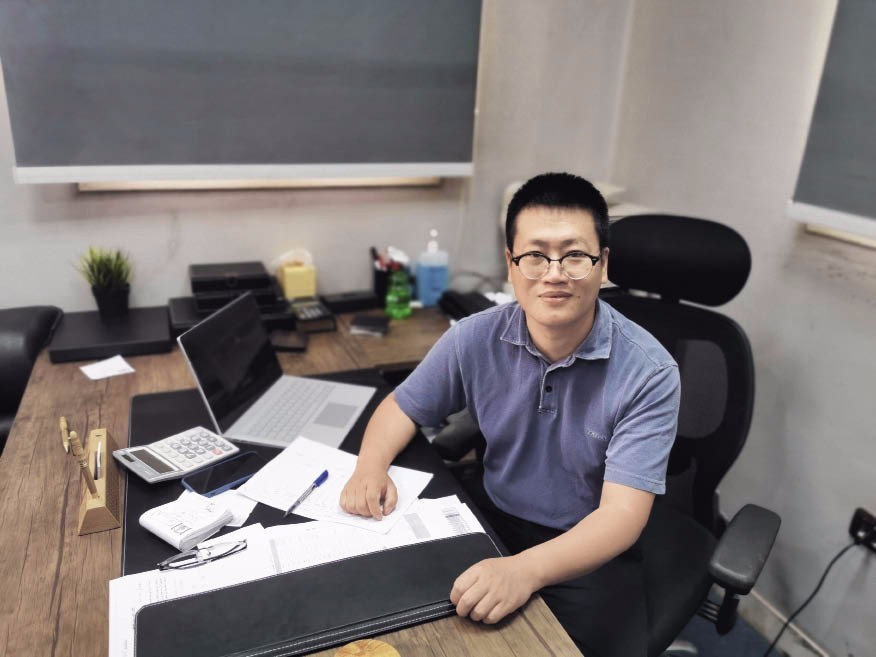
A Chinese engineer guides Egyptian co-workers on site.
“It was an exhausting period of time and the four months seemed even longer than four years,” said Hu, general manager of Ningbo Jiashang Import and Export Co., Ltd.
But the difficult time was worthwhile. Four month ago when China faced a severe shortage of anti-epidemic supplies, he came to Egypt to purchase face masks. Over the following days, he made a decision to set up a face mask factory in Cairo. Finally, four automated mask production lines were put in operation. Hu blazed a new trail of business transformation among private companies amid difficult times brought about by the ongoing COVID-19 epidemic.
Looking back on those days, Hu said that insisting on extensive consultation, joint contribution, and shared benefits are the driving force behind his life-changing venture.
Resolution in Difficult Times
In late January 2020, the novel coronavirus struck China’s Wuhan City, and spread to other parts of the nation rapidly. The situation was grave. With an increasing demand for face masks and mask fabric, many places had a short supply. Hu was entrusted by the Haikou municipal government to purchase face masks from the Egyptian company MEDIC. He flew to Cairo in mid-February.

Egyptian employees are busy on the mask production line.
“I originally [just] planned to buy all the face masks needed for Haikou, and everything else was unexpected,” said Hu. He recalled that in early February, few people expected a rapidly spreading pandemic worldwide, the accompanying skyrocketing demand for masks and other personal protective equipment (PPE) in Egypt, and the country’s ensuing export control.
“However, when I looked at the situation from another angle, I found opportunities in this crisis,” said Hu. He believes that under whatever circumstances, a country will safeguard its economy as well as people’s health. It is especially true to China and Egypt, which have a solid foundation for cooperation.
In late February, after doing thorough market research, Hu found that Egypt is a major producer of anti-pandemic materials in the Middle East and North Africa. He quickly decided to set up a production line for non-sterile medical surgical masks in the Nasr City Free Zone in Cairo, in partnership with a local leading company in the medical industry called Euromed. At that time, Hu still had some reservations, but was assured by Chinese embassy officials in Egypt who said that relations between the two countries were solid and his business would be ok.
Although Egypt is still battling COVID-19, it is out of confidence in Sino-Egyptian relations that nearly 8,000 Chinese people still chose to stay in the country. Many of them are from large Chinese enterprises.
Hu said that the perseverance of the compatriots gave him more confidence. Learning that some Chinese personnel were encountering difficulties in purchasing PPE, he immediately applied for a license to set up a face mask factory whose products will be sold on the local market.

Hu Xiaojun in his office.
Quality First
In recent years, Hu’s company has operated successfully in Ningbo, Zhejiang Province. His decision to set up an operation overseas therefore surprised many friends.
“Although I had set up a garment factory before, I am currently engaged as an import trade agency. To open a face mask factory in a foreign country was almost a 180-degree turn. Many friends jokingly asked me if I was crazy, but I knew this was the right road to take,” said Hu.
Hu had many reasons for the decision. Preferential tariffs offered by major economies including the United States and European Union (EU) on industrial products produced in Egypt are also an incentive. But more importantly, He wanted to help ramp up the production capacity of face masks in Egypt for the country’s pandemic fight.
“The deep mutual political trust between the two countries provided favorable conditions for Chinese companies to invest in PPE production in Egypt,” said Hu.
He emphasized the requirement of high-quality face masks with high-quality melt-blown fabrics. His original intention was to contribute to the fight against the pandemic by residents in Egypt, including Chinese in the country, while earning foreign exchange through exports.
“Relying on China’s advanced automation equipment, and strict control of the production process, we managed to produce face masks with the quality of the best in Egypt,” said Omar Abdou, head of Euromed.
Abdou said that the face masks are three-layer medical surgical masks. They are produced in accordance with EU standards and have been certified by German testing agencies.
Under the partnership, Hu provides funds, production equipment, and face mask accessories, and Abdou’s company is responsible for purchasing raw materials and providing production plants and workers.
“Profits are of course important to a business, but the main consideration of this cooperative project is to contain the pandemic. And only high-quality products can do that,” said Hu.
According to Abdou, in order to ensure the sterility of the production environment, the factory disinfected the floor of the workshop every three hours, and the machines and equipment once every hour. All employees wear disinfected uniforms, shoe covers, gloves, and head coverings and enter the workshop through a disinfection room. During the pandemic, the number of shifts was reduced. Before working, all employees undergo physical checks.
“Our masks are the most expensive among similar products in Egypt, but they are also the most cost-effective,” said Abdou. He said that since early April, inquiries and orders from the main departments responsible for controlling the pandemic, such as the Egyptian Ministry of Health, Ministry of the Interior, and some public medical material procurement agencies, have continued to come in. The Egyptian government is planning to procure the face masks for frontline medical and community workers.
John Jabbour, WHO representative in Egypt, recently revealed that the infection of frontline pandemic prevention workers accounts for about 15 percent of the total number of confirmed cases in Egypt.
Team Effort
“Egypt’s supply of N95 face masks and high-quality medical surgical masks have always relied on imports, and the number is relatively limited. If we just buy face masks from Egypt, it may seem like we are snapping up its limited resources,” said Hu.
His factory will effectively fill the gap in the local supply of face masks. The production capacity of the five production lines is conservatively estimated to reach 300,000 face masks per day. If the number of production lines is increased to 10, the output can exceed 600,000 per day.
According to Hu, the project is not only about making profits by taking advantage of preferential policies in the bonded zone, but about contributing to the local community.
In Hu’s view, as a private entrepreneur, in the face of a complex foreign business environment, only the ideas of extensive consultation, joint contribution, and shared benefits can be used to yield twice the result with half the effort.
“Our cooperation with Chinese friends is very pleasant. The face mask production lines helped us solve a big problem in pandemic prevention. More face masks can protect more Egyptians from the virus,” said Abdou.
“It took only a month to achieve this transnational cooperation project, which is inseparable from cooperation between the employees of China and Egypt and the strong support of the government departments of the two countries,” said Bassem Khalafallah, director of the Engineering Department of Euromed.
During the initial stage of building the factory, Chinese technical personnel helped to guide the operation via video calls. Installing and commissioning equipment and training workers in such a short period of time was also a big challenge, but through the cooperation of Chinese experts, the Chinese Embassy in Egypt, and Egyptian authorities, all was well handled.
The dedication and motivation for the project was well displayed by Egyptian factory staff member Ahmed Gamar. “Every time I think that the products I produce can help more people, I will work harder,” he said.
Han Bing, minister counsellor of the economic and commercial office of the Chinese Embassy in Egypt, said that during the special period of pandemic prevention and control, the operation of face mask production lines has effectively improved Egypt’s prevention and control capabilities. “We hope that we can overcome the virus, a common enemy of all humankind, at an early date,” Han said.
Dr. Hisham El-Sherif, director of the Public Relations Division of Egyptian Cabinet’s Information and Decision Support Center, expressed his appreciation for the face mask production lines established by Egyptian and Chinese businesses. “The mask production project is of great significance to the pandemic fight in Egypt. May Egypt and China join hands to overcome the pandemic as soon as possible,” he said.